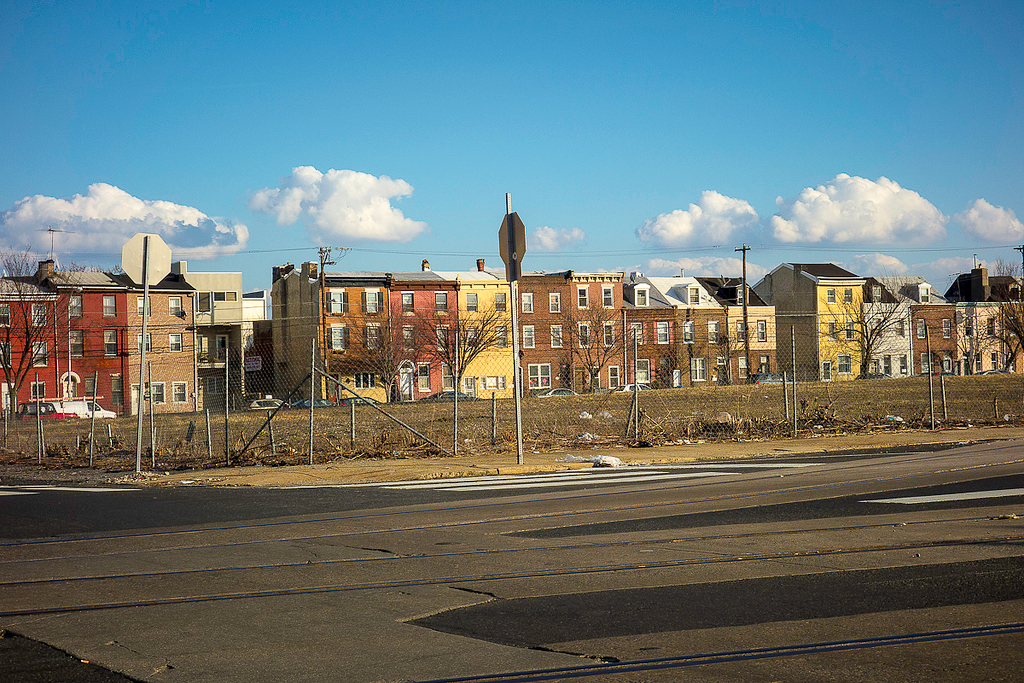Land bank hearing scheduled for Oct. 28, questions remain

This fall there is renewed hope for progress in the creation of a municipal land bank. Come October 28, land bank advocates will get their wish: City Council’s Committee on Public Property and Public Works will at long last hold a hearing [pdf] on the pending land bank bill.
Councilwoman Maria Quiñones-Sánchez introduced this version of the land bank legislation back in March. But, as PlanPhilly reported in May, Council’s attention this spring was consumed by property tax reform and the school-funding crisis, which didn’t leave much room for forward movement on the land bank. Advocates are hopeful, however, that now is the time.
Mayor Nutter and Council President Clarke both spoke in support of the creation of a land bank at last month’s Reclaiming Vacant Properties conference:
A land bank could help Philadelphia put thousands of vacant, publicly owned properties (as well as vacant, tax-delinquent privately-owned properties) into responsible hands. The hope is that if the city creates a transparent, predictable, consolidated, and efficient land disposition process, it will be easier to see so many of our city’s vacant properties put to new uses – from new housing or commercial development to gardens and side yards – and that will also help bolster the city’s tax rolls.
City Council President Darrell Clarke and Mayor Michael Nutter each expressed their support for the creation of a land bank at the Reclaiming Vacant Properties Conference, held in Philadelphia in September. (Notable because City Council and the Nutter administration haven’t always seen eye-to-eye on the land bank.) The conference cast new light on Philadelphia’s efforts to turn around its roster of vacant and tax-delinquent properties, and perhaps the national attention put a bit of pressure on our elected officials to get the land bank off of the ground.
“Things have started to align,” said Rick Sauer of the Philadelphia Association of Community Development Corporations, which is part of the Philadelphia Land Bank Alliance. “The conversation is not about whether a [land bank] makes sense, but what it should look like and how it should be implemented.”
The bill, as introduced, has the support of the Philadelphia Land Bank Alliance, a broad coalition of advocates that includes groups representing builders, neighborhood groups, environmental organizations, designers, and the Campaign to Take Back Vacant Land. The alliance, which helped craft the bill introduced in March, is hopeful that the land bank legislation will move through City Council with minimal changes.
But the bill could still be a moving target.
“We expect some minor amendments but are yet not clear on them. There are several meetings taking place and we will have more information soon,” said Councilwoman Maria Quiñones-Sánchez over email.
A likely point of continued conversation is the role council members will play in the land bank’s transactions and at what point in the process that happens.
By Charter, Council must approve property transfers or an interest in real property, so their role is locked in barring charter changes. What is unclear is whether or not council members will be content with using a committee structure to vote on land bank property transactions, as the bill currently stipulates, or if district councilmembers will prefer to introduce resolutions, as they do now, for property transfers in their districts.
The land bank bill would give new powers to the Vacant Property Review Committee, which would meet monthly, vote on property requests within 60 days, and offer a reason for any transaction they reject. That committee would be reconstituted by a piece of companion legislation, also introduced by Councilwoman Maria Quiñones-Sánchez in March, to be comprised of the 10 district councilmembers as its only voting members. Certain city agencies (like Revenue, Licenses & Inspections, and City Planning) would also sit on the committee but would not have a vote.
“We are clearly trying to streamline it and make it more transparent,” said Councilwoman Quiñones-Sánchez.
There are also practical questions about the composition of the land bank board of directors, how the city will be able to staff the land bank, and handle the maintenance of city-owned vacant parcels.
Despite these uncertainties, advocates see great potential in the land bank bill: a consolidated listing of city-owned (non-Philadelphia Housing Authority) properties, new powers to clean land titles, important tools for dealing with privately-owned tax delinquent properties, a clear timeline for and record of decisions on property requests, and a required strategic plan for dealing with vacant properties in a targeted way. All of this would add clarity and predictability to a process now that is anything but.
In particular, a strategic plan would help give the land bank focus by targeting certain areas as appropriate for certain types of new uses – from affordable housing in appreciating neighborhoods, or side yards in places where market-rate development is less likely in the near future. That sort of planning could help guide councilmanic decisions and reduce the possibility of each property request being evaluated on a transactional basis.
The land bank gives Philadelphia the “opportunity to take advantage of vacant properties of as an asset not just a liability,” Sauer said. “Unless we can repurpose these vacant properties that are currently a drain on the city and school district resources… unless we start eliminating that blighting influence in communities and getting these properties back in the tax base we don’t really have a long term solution for improving the tax base in the city.”
WHYY is your source for fact-based, in-depth journalism and information. As a nonprofit organization, we rely on financial support from readers like you. Please give today.





